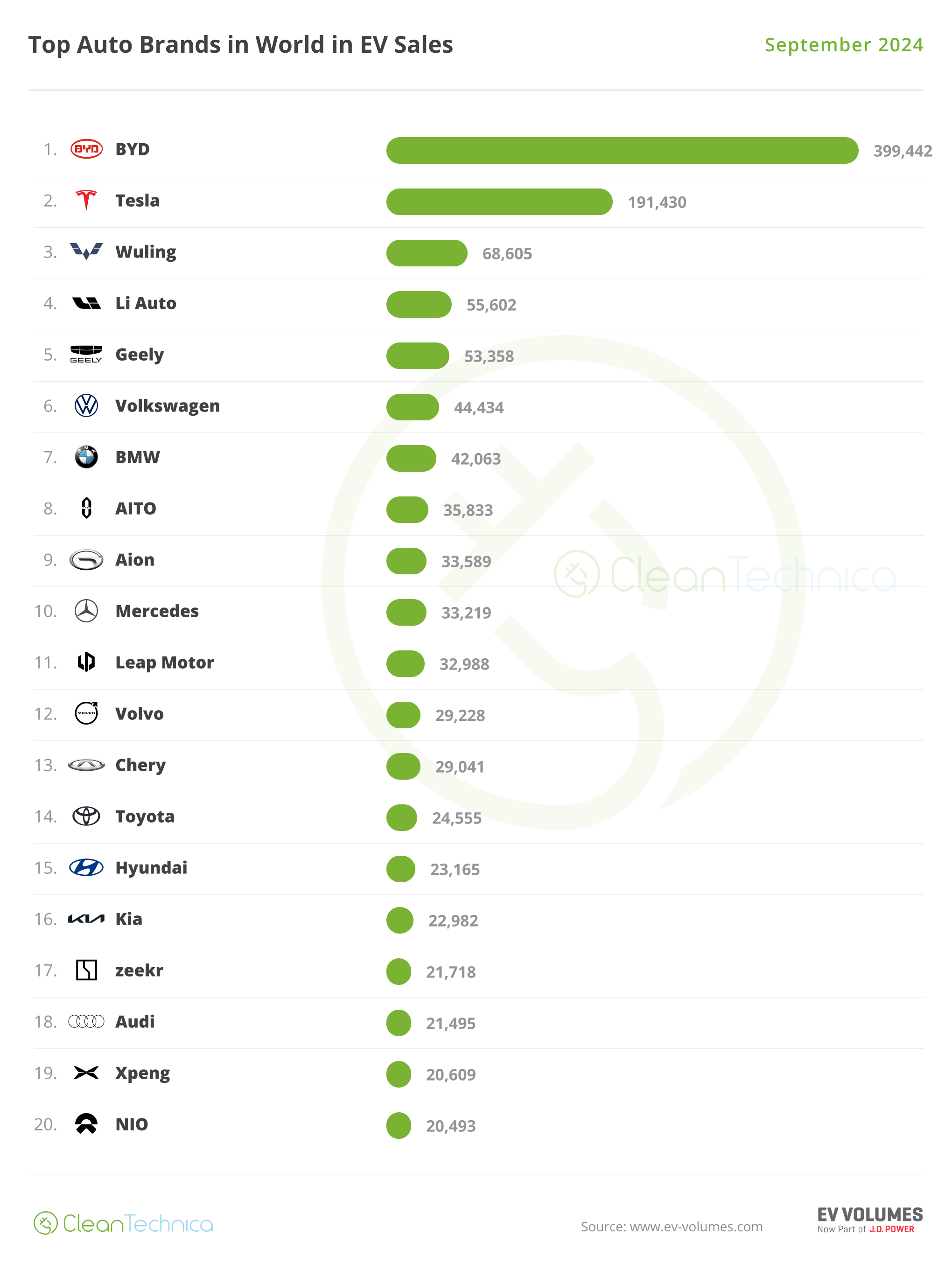Join every day information updates from CleanTechnica on electronic mail. Or comply with us on Google Information!
The race to construct extra knowledge facilities is placing a pressure on utility corporations. Information facilities are voracious shoppers of electrical energy and the growth in synthetic intelligence is making the scenario worse. An AI-powered web search consumes about 10 instances as a lot electrical energy as a standard search — though what’s regular is quickly altering. AI is the brand new “will need to have” characteristic of an more and more digital world. Google, as an illustration, now makes AI the default alternative when conducting search operations.
The variety of knowledge facilities is increasing quickly worldwide, which is resulting in delays within the scheduled closures of a number of coal-fired and nuclear producing stations. The world is demanding extra knowledge facilities, even when meaning pouring extra local weather altering emissions into the ambiance at a time after we ought to be sharply decreasing them. “Lord, what fools these mortals be,” William Shakespeare as soon as famous. Microsoft lately entered into an settlement to restart the shuttered nuclear energy plant on Three Mile Island in Pennsylvania to produce energy for its newest knowledge middle enlargement. A brand new 875 MW photo voltaic farm in Texas will ship 85% of its electrical energy to Google to energy its knowledge facilities in and round Dallas.
Information Facilities & Transmission Traces
Constructing sufficient new renewable vitality sources to satisfy the insatiable wants of Large Tech is tough sufficient, however connecting it to these knowledge facilities and server farms is one other problem that wants addressing. Constructing transmission traces and substations is an costly proposition. Within the customary enterprise mannequin within the utility business, these prices are borne by all subscribers, however constructing new infrastructure that primarily provides the wants of only one or two massive prospects locations an outsize burden on everybody else. Utilizing the present mannequin, atypical individuals are serving to subsidize the Googles and Microsofts and Amazons of the world by serving to to pay for the transmission upgrades they require.
That scenario has been the main focus of an ongoing controversy in Ohio, which is seeing a big improve within the variety of knowledge facilities proposed or beneath building in that state. The principal utility firm in that state, AEP Ohio, desires knowledge middle operators to decide to paying for nearly all the electrical energy they anticipate to make use of sooner or later so it will possibly make the required grid upgrades figuring out there shall be cash obtainable to pay for them. The info middle operators balked and proposed decrease assured funds. In a press launch dated October 23, 2024, AEP Ohio stated it had filed a settlement settlement that “addresses the intense energy wants of Ohio’s rising knowledge middle business whereas defending AEP Ohio’s different prospects.” The employees of the Public Utilities Fee of Ohio, the Ohio Customers’ Counsel, the Ohio Power Group, Ohio Companions for Reasonably priced Power, and Walmart joined AEP Ohio within the submitting.
“Ohio’s financial success in bringing knowledge facilities to our state comes with immense calls for for electrical energy, and we now have to satisfy these effectively and responsibly,” stated Marc Reitter, AEP Ohio president and chief working officer. “The settlement insulates our different prospects — together with residents, small companies, producers, and different industries — from the affect of the required infrastructure enhancements. Our aim all through this course of has been to offer prospects with protections, whereas preserving Ohio a horny place to run and develop a enterprise. This proposal gives that steadiness and was developed with PUCO employees and shopper advocates. I’m grateful for the exhausting work of all of our stakeholders.”
Pay Us Now, Not Later
This settlement, which is topic to evaluation and approval by the PUCO, requires massive new knowledge middle prospects to pay for at least 85% of the vitality they are saying they are going to want every month — even when they use much less — to cowl the price of infrastructure wanted to convey electrical energy to these amenities. It additionally creates a sliding scale that enables small and midsized knowledge facilities extra flexibility. And it requires knowledge facilities to offer proof they’re financially viable and in a position to meet these necessities, in addition to to pay an exit price if their challenge is canceled or unable to satisfy the obligations outlined within the electrical service settlement contract. The necessities can be in place for as much as 12 years, together with a 4-year ramp-up interval. Beforehand, a bunch of knowledge middle business leaders filed a separate settlement, which was not supported by AEP Ohio, the PUCO employees, OCC, or OEG. They proposed to pay for at least 75% of the vitality they are saying they are going to use and excluded necessary buyer protections and included different problematic provisions of their deal.
Information middle growth has expanded quickly in recent times throughout AEP Ohio’s service territory. Electrical energy demand in Central Ohio, pushed largely by knowledge facilities, already is anticipated to greater than double by 2030, AEP stated. “Our proposal acknowledges the significance of knowledge facilities, not solely to our area and Ohio’s economic system, however to the nation at massive,” Reitter stated. “We welcome the unbelievable funding massive knowledge facilities are making in Ohio. Our settlement strikes a steadiness between the pricey investments required for high-powered cloud and AI wants and protections for AEP Ohio’s different prospects.”
Who Ought to Pay For Information Facilities?
Who pays to convey electrical energy to knowledge facilities? That may be a query that’s being requested all throughout America. In accordance with Google AI, the price of transmission amenities is socialized throughout all customers of the system, together with those that might circuitously profit from the infrastructure. This has led to tensions in areas the place knowledge middle progress is concentrated, reminiscent of Ohio.
A report by the Washington Publish says the dispute in Ohio “might assist reply one of many hardest questions hanging over the nation’s energy grid: Who can pay for the large upgrades wanted to satisfy hovering vitality demand from the info facilities powering the trendy web and synthetic intelligence revolution?” Google, Amazon, Microsoft, and Meta all opposed the plan supported by AEP Ohio and the employees of the Ohio PUC.
AEP Ohio stated projected vitality demand in central Ohio compelled it to cease approving new knowledge middle offers there final 12 months whereas it discovered pay for the brand new transmission traces and extra infrastructure they might require. The vitality calls for of knowledge facilities have created related considerations in different sizzling spots reminiscent of Northern Virginia, Atlanta, and Maricopa County, Arizona, leaving specialists involved that the US energy grid might not be able to coping with the mixed wants of the inexperienced vitality transition and the computing growth that synthetic intelligence corporations say is coming.
Severin Borenstein, a professor of economics from the College of California at Berkeley, advised the Publish that tech corporations have good purpose to combat the Ohio proposal. Different utilities across the nation which might be additionally involved concerning the “volatility” of knowledge middle growth shall be carefully watching this case, he stated, doubtlessly making such fights “a way more widespread negotiation.”
The Takeaway
We aren’t speaking about minutiae right here. AEP Ohio Vice President Lisa Kelso stated there are 50 pending requests from knowledge middle prospects looking for electrical service at greater than 90 websites in Ohio. If all of them are permitted and constructed, they are going to want as much as 30,000 megawatts of electrical energy — sufficient to energy greater than 20 million households. That extra demand would greater than triple the utility’s earlier peak load in 2023, she stated.
And but the tech corporations really feel they’re being unfairly discriminated towards. Power advisor Brendon Baatz in testimony submitted to the Ohio regulator on behalf of Google stated, “With its discriminatory deal with knowledge facilities, AEP Ohio is asking the Fee to select winners and losers within the native economic system by imposing unfavorable phrases for fundamental electrical service on a single business.” Most readers will acknowledge that phrase “winners and losers” as code these against authorities regulation routinely trot out to justify their very own unfair benefit. Apparently Google thinks it’s truthful for a widow on a hard and fast earnings to pay extra for electrical energy so it will possibly generate extra AI-generated content material.
Michael Fradette, an vitality skilled who testified on behalf of Amazon Internet Providers, stated that asking corporations to foretell how a lot energy their knowledge facilities will want over a 10-year interval with a excessive diploma of accuracy is “unreasonable,” as a result of precise consumption will rely upon components reminiscent of future technological development, buyer demand and “volatility of climate.” Apparently Jeff Bezos and firm imagine utilities ought to spend huge on transmission upgrades with no assure their funding will ever be paid off.
There’s a answer to this. Let knowledge corporations create their very own renewable vitality sources and construct their very own transmission traces. That method, the dictates of the capitalist mannequin are fulfilled — put capital in danger with the expectation of producing a passable return on funding. If that return doesn’t materialize, the businesses lose, not particular person ratepayers. That appears eminently truthful and affordable, doesn’t it?

Chip in a number of {dollars} a month to assist help unbiased cleantech protection that helps to speed up the cleantech revolution!
Have a tip for CleanTechnica? Wish to promote? Wish to counsel a visitor for our CleanTech Speak podcast? Contact us right here.
Join our every day e-newsletter for 15 new cleantech tales a day. Or join our weekly one if every day is simply too frequent.
Commercial
CleanTechnica makes use of affiliate hyperlinks. See our coverage right here.
CleanTechnica’s Remark Coverage




